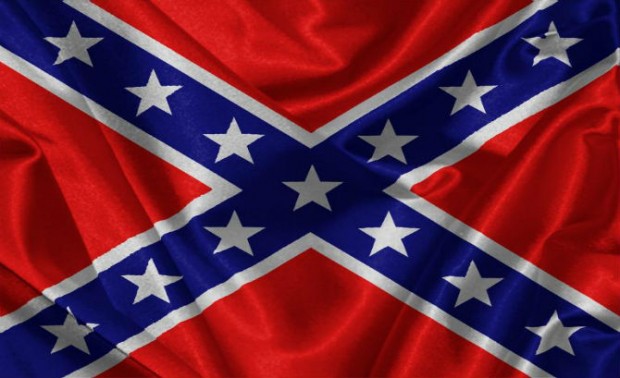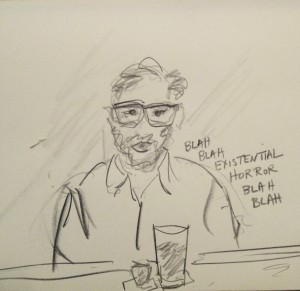
Guest contributor: Vince Passaro
Guy at the Bar: Vince Passaro on Post-Racial Life
categories: Cocktail Hour / Don't Talk About Politics / Guest Columns
1 comment

It now seems undeniable to me that we have been living in a 50 year semi-coordinated backlash against the civil rights movement. There is no other way to explain how the conditions of economic and political life of African-Americans gets worse, while “racism” putatively wears away, and we become (laughs here) post-racial. I remember my working class white relations (largely but not entirely the males), furious throughout my childhood at the claims of African-Americans, the demands for equality. I remember the combined total of votes for Richard Nixon and George Wallace in 1968: 60 percent — even McGovern did better than Humphrey did that year, only four years after Lyndon Johnson’s landslide.
 I remember the assassinations. I remember the de-toothing of HUD (Department of Housing and Urban Development, created to enforce the fair housing laws that flowed from the Civil Rights Act of 1965) after Nixon fired George Romney, it’s first head. I remember the mothers, the mothers! turning over a school bus in Boston… I remember how short-lived busing was, how disparities in the funding of public schools grew worse and worse, how the schools in most of America remained segregated or grew more so. I remember how the massive expansion of the penal system was followed by systematic criminalization of being a young black male, how the prison population went up to near 2 million by the end of the Reagan years (it’s now well more than 2 million). I remember Reagan: his fantasy that a woman on welfare bought a few oranges with her $20 food stamp and then took the change and bought a bottle of vodka… fantasy because actually it isn’t possible to do what he said and he and his staff knew it – you didn’t get cash back for food stamps, you got other denominations of food stamps, which liquor stores do not accept. But I remember how the story felt so good to so many people. It felt SO good. I remember the Willie Horton ad in 1988 — the transparency of it, the crudeness — and I remember Clinton, early in 1992, abandoning for two days the New Hampshire primary campaign, where he was slipping badly and which he couldn’t really *afford* to abandon, just so that he could be sure to be in Little Rock when they executed a black man who’d lost half his brain in the shoot out that led to his capture. I remember this particular prisoner was reported to have asked if the guards could “save” the dessert from his last meal, so he could eat it “tomorrow.” Thus were Clinton’s “I’m no Dukakis, I Kill Negroes” bona fides established. (Why he was popular in the black community remains a mystery to me, as his policies did nothing but hurt that community). I remember when it became clear that there was no way a black man arrested for a minor crime (no matter his previous record, the dubiousness of the charges, or any other mitigating factor) would get a fair trial, would not serve time. I remember that black unemployment in the cities has steadily exceeded what its traditional levels had been prior to, say, 1965, when the Civil Rights Act passed and the “War on Poverty” got underway. I remember how mysteriously the Reagan era “war on drugs” somehow led to plentiful cheap cocaine and shortages and skyrocketing prices for marijuana, the relatively harmless drug of choice before crack. I remember crack. I remember the CIA assisting in and taking cash profits from cocaine trafficking out of Central America, and pouring cheap cocaine into American cities, so that they could give the money, illegally, to the contras. I remember more than this, but I’ll spare you. They did give us all a day off in honor of Martin Luther King (well, except in a couple of states) so what am I complaining about? I remember every implicitly self congratulatory (for whites) PBS special on the glorious victories of the civil rights movement while gerrymandering and bogus new voter ID legislation has further restricted black people’s abilities to vote. We made sure the civil rights movement succeeded in public and failed in private. We have made, since then, poverty invisible, created a numbing celebrity culture that makes the poor invisible even to themselves. It’s a masterful job. I congratulate us. They arrested the white guy for shooting nine black humans and put a bullet proof vest on him, lest anyone try to shoot him. They stopped at Burger King to get him some food. See? They care.
I remember the assassinations. I remember the de-toothing of HUD (Department of Housing and Urban Development, created to enforce the fair housing laws that flowed from the Civil Rights Act of 1965) after Nixon fired George Romney, it’s first head. I remember the mothers, the mothers! turning over a school bus in Boston… I remember how short-lived busing was, how disparities in the funding of public schools grew worse and worse, how the schools in most of America remained segregated or grew more so. I remember how the massive expansion of the penal system was followed by systematic criminalization of being a young black male, how the prison population went up to near 2 million by the end of the Reagan years (it’s now well more than 2 million). I remember Reagan: his fantasy that a woman on welfare bought a few oranges with her $20 food stamp and then took the change and bought a bottle of vodka… fantasy because actually it isn’t possible to do what he said and he and his staff knew it – you didn’t get cash back for food stamps, you got other denominations of food stamps, which liquor stores do not accept. But I remember how the story felt so good to so many people. It felt SO good. I remember the Willie Horton ad in 1988 — the transparency of it, the crudeness — and I remember Clinton, early in 1992, abandoning for two days the New Hampshire primary campaign, where he was slipping badly and which he couldn’t really *afford* to abandon, just so that he could be sure to be in Little Rock when they executed a black man who’d lost half his brain in the shoot out that led to his capture. I remember this particular prisoner was reported to have asked if the guards could “save” the dessert from his last meal, so he could eat it “tomorrow.” Thus were Clinton’s “I’m no Dukakis, I Kill Negroes” bona fides established. (Why he was popular in the black community remains a mystery to me, as his policies did nothing but hurt that community). I remember when it became clear that there was no way a black man arrested for a minor crime (no matter his previous record, the dubiousness of the charges, or any other mitigating factor) would get a fair trial, would not serve time. I remember that black unemployment in the cities has steadily exceeded what its traditional levels had been prior to, say, 1965, when the Civil Rights Act passed and the “War on Poverty” got underway. I remember how mysteriously the Reagan era “war on drugs” somehow led to plentiful cheap cocaine and shortages and skyrocketing prices for marijuana, the relatively harmless drug of choice before crack. I remember crack. I remember the CIA assisting in and taking cash profits from cocaine trafficking out of Central America, and pouring cheap cocaine into American cities, so that they could give the money, illegally, to the contras. I remember more than this, but I’ll spare you. They did give us all a day off in honor of Martin Luther King (well, except in a couple of states) so what am I complaining about? I remember every implicitly self congratulatory (for whites) PBS special on the glorious victories of the civil rights movement while gerrymandering and bogus new voter ID legislation has further restricted black people’s abilities to vote. We made sure the civil rights movement succeeded in public and failed in private. We have made, since then, poverty invisible, created a numbing celebrity culture that makes the poor invisible even to themselves. It’s a masterful job. I congratulate us. They arrested the white guy for shooting nine black humans and put a bullet proof vest on him, lest anyone try to shoot him. They stopped at Burger King to get him some food. See? They care.
###
Meanwhile… since the assassinations in Charleston there’s been a feeble but persistent debate about racism vs. gun control vs. insanity: to which we can simply say, yes. It’s not portions of each. Racism is insanity, but not the excusable kind: it’s the denial of an inescapable human truth. Empathy, sympathy, love and community all were essential parts of daily human existence before we find evidence in human history of any detectable, coherent religion. To fail to recognize and *feel* the obligations of this element of our humanity is to be radically broken. So yes, it’s insane.
And gun control? Racism is the REASON we don’t have and we never will have constitutional and reasonable control on guns in this country. Looked at from the perspective of any other developed nation our failures in this arena also appear to be willful and insane. We monitor dogs and mopeds more than we monitor guns. We are — to get back to the human idea — tribal, yes. But the reason we have racism against African-Americans (by putative whites, though guess what boys, who knows where your mama mighta snuck around….) that goes so much deeper and lasts interminably longer, generation upon generation upon generation, than any hostility we manifest toward Latinos or any other immigrant group is because none of those “others,” as “other” as they may be, represent to us our own crimes and none of the others refuse so utterly to submit to our narratives. None of the others frighten us with the haunting notion of revenge. We (white Americans) are living with the all-too knowing children of our rapacity. They were our property but now they talk back. They do not wish to be like us, to emulate us or assimilate with us. They are generally willing to get along but it will be many, many more years before they trust us or think we’re sane.
There is so much more than this element of insanity and violence to our racism — its economic imperatives primary among them. But the unmoneyed white guys with the lame-brained ideologies and major ordinance are not the same as the men and women in suits who have decided year after year, decade after decade, to skew the system, to evade or neglect to enforce school and housing desegregation laws, to use the penal code as the new chains of slavery, to turn the police into paramilitaries. The one group is a product of the other, the one feeds off the other, but they are not the same. (Go out with a perfectly nice real estate agent somewhere, anywhere in America where black and white live in some proximity to each other, and listen to her or him talk about the “good” schools and the necessity of living where one’s children will attend them. Real money rides on these completely unnecessary and criminal distinctions. Do you dare to contradict her?) Our cynicism and resignation regarding these matters are a form of evil and every day that evil corrupts us.
 Vince Passaro is the author of Violence, Nudity, Adult Content: A Novel (Simon and Schuster, 2002 and S&S Paperbacks, 2003), as well as numerous short stories and essays published over the last 25 years in such magazines and journals as The New York Times Sunday Magazine, The Times (London) Sunday Magazine, The New York Times Book Review, The Nation, The Village Voice, The New York Observer, Esquire, GQ, and Harper’s Magazine, where he is a contributing editor. He’s also the guy sitting alone at the end of the bar, plenty to say to those who will listen…
Vince Passaro is the author of Violence, Nudity, Adult Content: A Novel (Simon and Schuster, 2002 and S&S Paperbacks, 2003), as well as numerous short stories and essays published over the last 25 years in such magazines and journals as The New York Times Sunday Magazine, The Times (London) Sunday Magazine, The New York Times Book Review, The Nation, The Village Voice, The New York Observer, Esquire, GQ, and Harper’s Magazine, where he is a contributing editor. He’s also the guy sitting alone at the end of the bar, plenty to say to those who will listen…

Thank you for this.